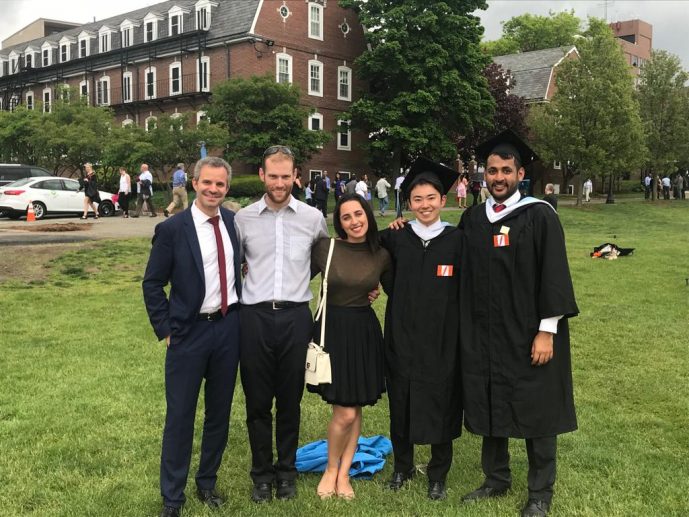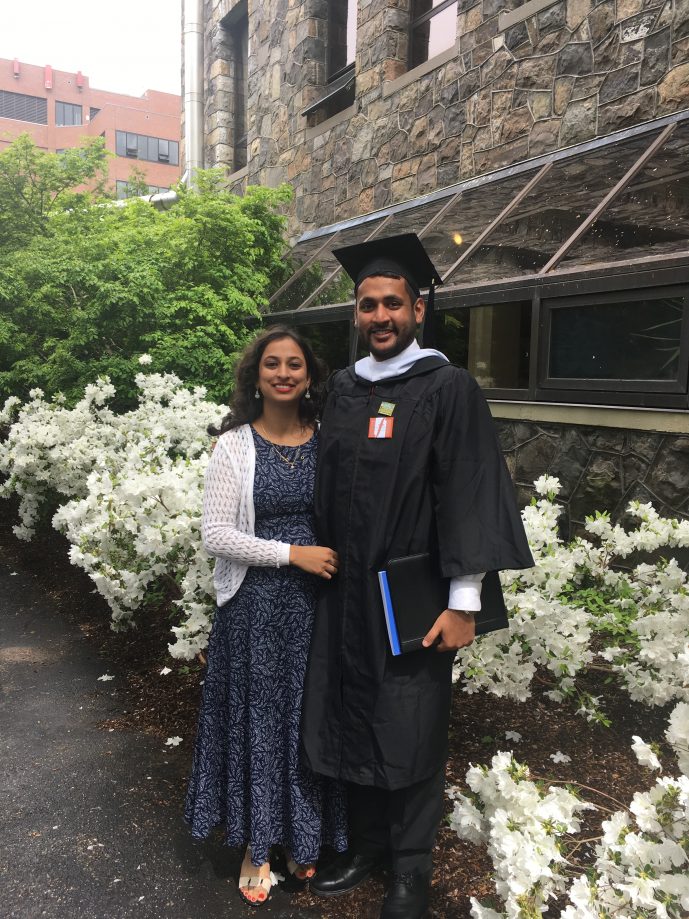Pulkit’s words to his classmates
Not only did Pulkit graduate in May, but he was one of the two students elected by their peers to give speeches at Commencement. For his final post as a Student Stories writer, he has shared his speech with the blog. I can confirm that Pulkit carefully followed his father’s advice that he describes below.
Congratulations to the Class of 2018!
Thank you for this greatest honor. For a boy from India, whose parents always pushed him to go beyond what he thought he was capable of, this is big. I cannot express how happy I am in this very moment. There is no place I would rather be, than here — to celebrate with you all.
I see happy and smiling faces. Did you know that in Hindi, Pulkit means Happiness. My father gave me this name. Before I began this journey here at the Fletcher School, he also told me to greet everyone with a big smile. That there was no comparison to a smile, and that the smile is the most lethal weapon ever invented and produced. He asked me to proliferate smiles and happiness. Even if you tear up today, those are tears of happiness.
As we all turn a page today, firstly, it is befitting of me to thank you and pay my respects.
In Sanskrit, there is a word, and most of you must have heard it. It is a beautiful word: formed by the amalgamation of two words – नमः and ते, नमस्ते (namaste) and means “I bow to Thee.” It is very analogous to the Japanese tradition of bowing in respect.
 Today, I bow to thee, Dear Fletcher School. As an institution of learning and a place I am proud to call home; your warmth embraced and held me, nurtured me, and nudged me forward.
Today, I bow to thee, Dear Fletcher School. As an institution of learning and a place I am proud to call home; your warmth embraced and held me, nurtured me, and nudged me forward.
I bow to thee, Dear Professors, in reverence and gratitude. When you shared your knowledge, you shared it with utmost honesty. You implored us to listen intently, question the status quo, and to zealously advocate for the weak and powerless.
I bow to thee, Dear Staff. Thank you for guiding and supporting us all throughout. You made life easier for us.
I bow to thee, Dear Family and Friends. Thank you for all your sacrifices. You struggled before me in order for me to be here. You were there since the very beginning — from scrambling to find resources to fund our education, to keeping us in your thoughts and prayers, and for encouraging us all along the way.
To Fletcher spouses — for taking care of home and children, and lending support as we labored through our assignments. It wasn’t easy. Thank you.
I bow to thee, Dear Classmates, my friends and peers. Your exemplary courage and due diligence to work on the most pressing global issues and your tenacious pursuit of knowledge is immensely commendable. I am proud to be one of you.
The first time I had heard about the Fletcher School, I was sitting in a cubicle in India — in the process of finding purpose in the work that I was doing. As I was rummaging through Fletcher’s website, I remember thinking to myself, “I can never get there.” Since my admission to the Fletcher School, it has been a remarkable and extraordinary journey of self-discovery. We are here now, ready to Commence. A big part of my journey, my story, has been you, my fraternity at the Fletcher School, and your powerful, captivating stories.
What is it about institutions that makes them so powerful? Apart from the ideas that dwell there, it is the people, and here at Fletcher, I have found and interacted with the best. I have found inspiration in your stories. We realized in one form or other that these stories were the common thread that bound all of us — in classrooms, during study groups and case study preparation, during educational tours, and during cultural nights. When you generously and thoughtfully shared your experience, you stimulated my curiosity. When you asked the tough questions, you challenged me and my assumptions. You forced me to think critically. As I interacted with you, my dear friends and classmates, I started internalizing bits and pieces of you. These interactions gave me an opportunity to dig a little deeper, to introspect, and critically analyze my own history and my perceptions of your history.
 I know that I have changed and I know I am taking a part of you with me. I know this is true for you too. Let me share a story. I live with four housemates, from Japan, France, Brazil, and the United States. Over the year, organically, we cultivated a habit of dining together. Every night when the weary souls would get back home, we would share our resources, and cook together. Our understanding of each other has now come to a point where we all prefer a French croissant for breakfast every Sunday morning, and the Indian Basmati rice for dinner.
I know that I have changed and I know I am taking a part of you with me. I know this is true for you too. Let me share a story. I live with four housemates, from Japan, France, Brazil, and the United States. Over the year, organically, we cultivated a habit of dining together. Every night when the weary souls would get back home, we would share our resources, and cook together. Our understanding of each other has now come to a point where we all prefer a French croissant for breakfast every Sunday morning, and the Indian Basmati rice for dinner.
To me that is what Fletcher embodies — an oasis of knowledge and a place of confluence of peoples from all across the globe and from different walks of life. At Fletcher, I have learned to listen to people’s stories with humility, and most importantly to appreciate the diversity of opinion.
Even as I continue to thank Fletcher, I nudge it to be more inclusive of diversity of ideas and people. We, too, owe a bit of ourselves to this institute — and hope we all will contribute to the growth of this institution and for the next generation of students’ ability to be here.
We are ready to commence our journeys with a mix of pride, jubilation, and expectation. As my friend Lauren pointed out, Fletcher has set the wheels in motion and now we are to keep moving them forward. We are to use the foundation that Fletcher has help us lay, and in furtherance of it as we continue to seek, we are to find the answers. In the words of Mark Watney, from the movie The Martian, “You begin. You solve one problem… and you solve the next one… and then the next. And If you solve enough problems, you’re home.”
In time, as we all move on to taking roles in different institutions and organizations, the challenge is not whether we will be successful. After all, we are walking in the shoes of legends. The challenge is to work in contexts of discrimination and with marginalized communities. The challenge is how to lead others and to be a resource for everyone in the face of adversity. To that effect, I encourage you to treat the world with compassion and kindness.
Today, whether you are an MIB, an LLM, an MA, a MALD, a MAHA, or a PhD — as my friend Clare shared with me, a common characteristic that binds all of us is a sense of pragmatic optimism for the world. Whether through business, security, diplomacy, gender studies, civic or humanitarian action, we at Fletcher believe that people-to-people cooperation and international cooperation ought to and can build a better future for the world.
I sincerely hope we all continue to place faith in that belief.
You are extraordinary, Fletcher.
Watch the speeches given by Pulkit (starting at about 17:30) and Laurance below.